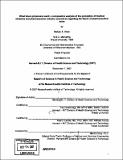What future physicians want : a comparative analysis of the perception of medical students and pharmaceutical industry executives regarding the future of pharmaceutical sales
Author(s)
Khan, Rehan A. (Rehan Abbas)
DownloadFull printable version (4.530Mb)
Alternative title
Comparative analysis of the perception of medical students and pharmaceutical industry executives regarding the future of pharmaceutical sales
Other Contributors
Harvard University--MIT Division of Health Sciences and Technology.
Advisor
Teo Forcht Dagi and Pedro Huertas.
Terms of use
Metadata
Show full item recordAbstract
The leading publicly traded pharmaceutical companies ("Big Pharma) in the US are facing a commercial crisis - their sales structure collectively consisting of more than 100,000 pharmaceutical sales representatives, originally setup to launch blockbusters, is suffering as a result of shrinking pipelines and low NME approvals. Although sales and marketing constitutes by far the largest corporate expense at 33% of revenues, sales productivity continues to decline. The goal of this study is to explore how pharmaceutical sales will change over the next 5 - 7 years and more specifically explore the role technology (including the internet) will play in the sales process. The study focuses on testing the perceptions of two key stakeholders -pharmaceutical executives and current medical students (future physicians) regarding the future of pharmaceutical sales process. Accordingly, 33 individuals were interviewed of which 18 were pharmaceutical executives and 15 were future physicians. The study tests three hypotheses: 1. Pharma executives believe that sales representative based detailing will continue to be the predominant method to engage and sell to physician customers while future physicians believe that technology will play a dominant role in the pharmaceutical detailing process. 2. Pharmaceutical executives agree that the most effective and ethical method to convey the benefits and challenges of an ethical pharmaceutical product are via a trained sales representative while future physicians believe that the sales representative does not effectively and ethically convey the merits of the relevant pharmaceutical therapy. 3. Person to person contact is not essential in conveying the merits of a particular ethical therapy - pharmaceutical executives disagree with this premise while future physicians agree. (cont.) The data sets were compared using the following statistical tests: Yates' chi-square test, Armitage's chi-squared test and Two sample test of binomial proportions. In conclusion, the data showed that the perceptions of pharma executives and future physicians were in concurrence with each other.
Description
Thesis (S.M.)--Harvard-MIT Division of Health Sciences and Technology, 2007. Includes bibliographical references (leaves 71-73).
Date issued
2007Department
Harvard University--MIT Division of Health Sciences and TechnologyPublisher
Massachusetts Institute of Technology
Keywords
Harvard University--MIT Division of Health Sciences and Technology.